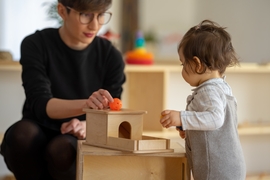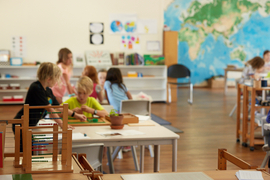
By Sarah Bourne
When I was an Occupational Therapy student in London a hundred years ago, I was asked to assess a school for wheelchair accessibility – they were expecting a student with Spina Bifida, and she needed to be able to get around. I walked into that school and couldn’t believe that the room was full of 3-6 year olds. It was quiet! Everyone was working, either on their own or in small groups. The staff were standing back, waiting to be needed. It was like no school I had ever been to. Of course, it was a Montessori school. I swore there and then that if ever I had children, they would go to one of these places.
Fast forward twenty years and half a world away. I had a daughter and as I watched her begin to negotiate her world, the curiosity and intensity with which she explored her environment, I remembered that school in London and was overjoyed to discover that there was a Montessori school near enough for her to attend.
Our three children went through pre-primary and primary at Montessori, and I believe their experiences there shaped them into the independent, caring, involved, socially aware young people they are today.
As a parent, and as an Occupational Therapist whose work was about helping people to become independent again after illness or injury, the main thing I loved about their Montessori education was the choices the children were given. I understand that it takes a lot of work and preparation to build an environment where this is possible, and I am grateful to the Directors who diligently worked so hard to create this place where the children could explore their interests, extend themselves, maintain their curiosity and feel proud of their achievements. This is not because an adult told them that they had done well, but because they had followed their passion to its conclusion. They internalised the good feelings which spurred them on to other things without needing to be pushed (except perhaps with Math – none of my children liked Math!) because learning was fun! Learning made them feel good.
When I heard friends talk about their children struggling at school because they hadn’t got a merit award, or been voted ‘Most Popular Person of the week’, I cringed. What message were these ‘awards’ giving their children? That to be liked, to get ahead, you had to be the best as perceived by an adult? My children learned that everyone has value, that everyone sometimes needs help, and that everyone can be a helper. They learned about teamwork and cooperation, as the older children in each stage they learned about being role models, about leading by example, about service to others being important to a community.
I am proud of my children who are now young adults; one a Social Worker, one studying Psychology, the other still making up his mind. But all of them are kind, respectful, inclusive members of society, and Montessori education helped them become those things and encourage them in others.



